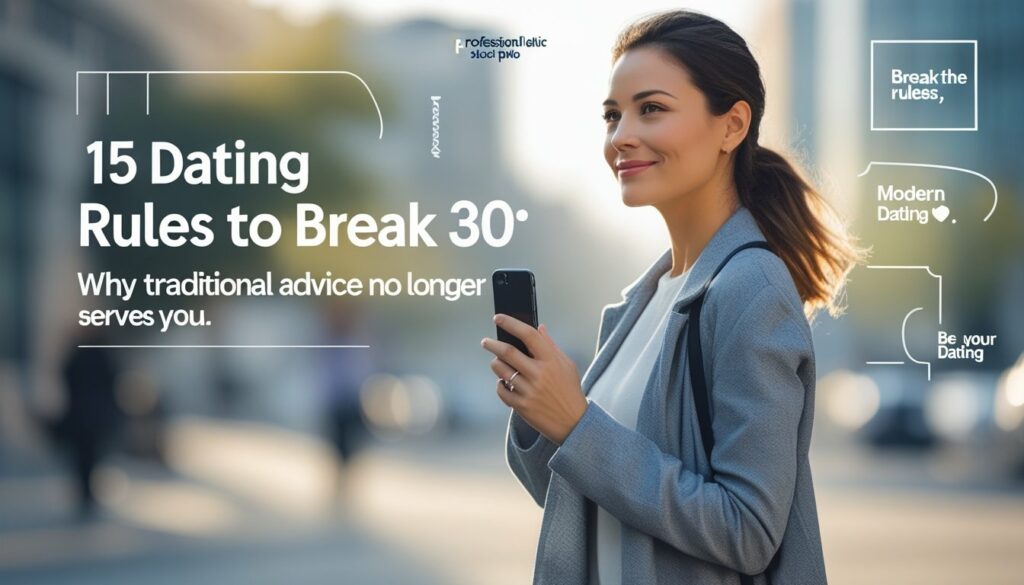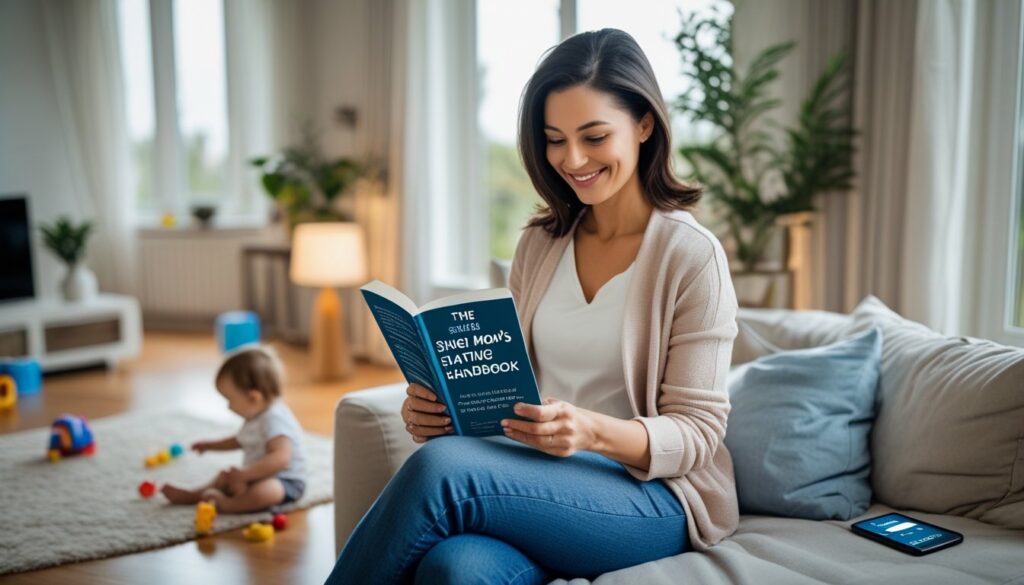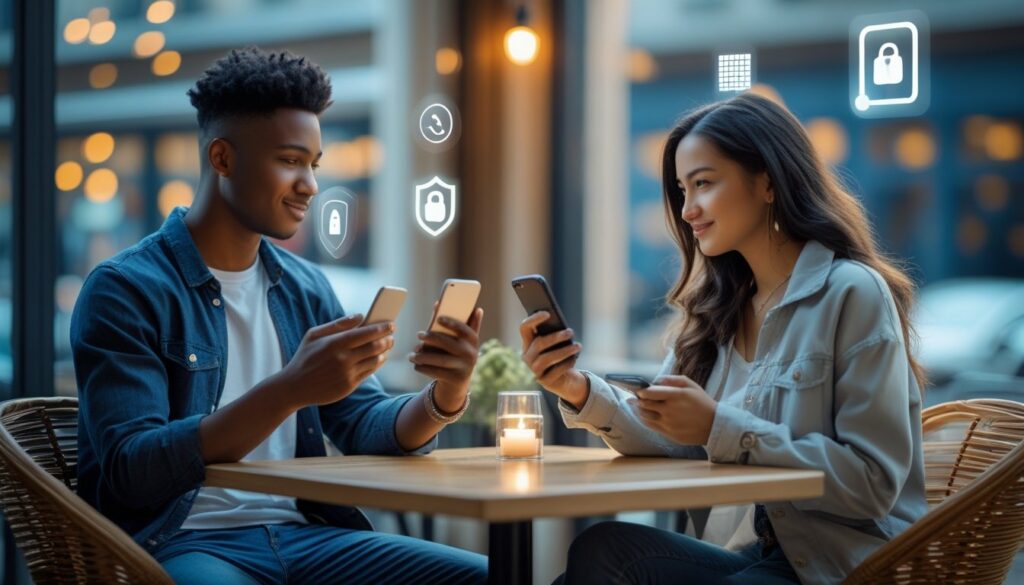Dating in your thirties feels different than it did in your twenties. You have more life experience, better self-awareness, and clearer goals.
Many traditional dating rules that worked in your twenties can actually hurt your chances of finding meaningful connections after 30.

The dating advice you followed in your twenties might be holding you back now. You don’t need to play games or follow outdated formulas anymore.
Your priorities have changed. Your approach to dating should change too.
1) Stop apologizing for your standards

You know what you want in a partner by now. So why are you still saying sorry for it?
Your standards aren’t too high. They’re based on years of experience and knowing yourself better.
When you apologize for wanting someone who shares your values, you lower your worth. You deserve someone who gets excited about the same things you do.
Stop explaining why you won’t date someone who doesn’t meet your needs. You don’t owe anyone a relationship just because they’re interested.
Your friends might say you’re being picky. But would you rather settle for someone who doesn’t make you happy?
Think about it this way. You wouldn’t apologize for wanting a job that pays well and treats you right.
Dating works the same way. Having clear standards saves everyone time.
You’ll find better matches when you’re upfront about what matters to you. Your standards protect your energy and emotional health.
They help you build the kind of relationship you actually want.
2) Don’t wait too long to say how you feel

Remember playing games in your twenties? Waiting three days to text back or keeping your feelings secret for months?
That approach doesn’t work in your thirties. You’re older now.
Your time is more valuable. When you like someone, tell them.
If you want something serious, say it. Don’t waste weeks wondering what they’re thinking.
Most people in their thirties appreciate honesty. They want to know where they stand.
Playing hard to get often backfires because mature adults move on quickly. You might worry about seeming too eager.
But there’s a difference between being desperate and being direct. Saying “I really enjoyed tonight and would love to see you again” isn’t clingy.
Life gets busy after thirty. People have careers, kids, and responsibilities.
They don’t have time to decode mixed signals or play guessing games. If you’re looking for something real, be real about it.
The right person will respect your honesty. The wrong person will run away, which saves you time anyway.
Your feelings matter. Share them sooner rather than later.
3) Break the rule of ‘playing hard to get’

Forget the old advice about waiting three days to text back. You’re in your thirties now, and games are exhausting.
Playing hard to get might have worked in your twenties. But now you want real connections, not drama.
Why pretend you’re not interested when you actually are? Being direct shows confidence.
If you like someone, let them know. Send that text when you want to.
Answer calls promptly. The right person will appreciate your honesty.
They won’t think you’re too eager or desperate. They’ll see you as someone who knows what they want.
Games waste time you don’t have. You could spend weeks playing cat and mouse with someone who loses interest.
Or you could be upfront and find out quickly if there’s real potential. Your authentic self is more attractive than any strategy.
When you drop the act, you attract people who actually like you for who you are. This doesn’t mean being clingy or overwhelming.
It means being genuine about your interest level. Be clear about what you want from the relationship.
4) Ignore societal pressure to settle down fast

Society loves to set deadlines for your love life. People ask when you’re getting married or having kids like there’s an expiration date on happiness.
Your timeline is yours alone. Just because your friends are getting engaged doesn’t mean you need to rush into anything.
The pressure gets stronger after 30. Family members drop hints at every gathering.
Coworkers share their opinions about your single status. Rushing into relationships because of outside pressure rarely works.
You end up with the wrong person for the wrong reasons. Quality matters more than speed.
A relationship that starts at 35 can be just as amazing as one that begins at 25. Don’t let anyone make you feel behind in life.
Some people meet their perfect match early. Others find love later.
Both paths are completely normal. Take your time to find someone who truly fits your life.
The right person will be worth the wait, no matter what age you meet them.
5) Trust your intuition over dating ‘formulas’

You’ve probably heard all the rules before. Wait three days to text back.
Don’t kiss on the first date. Play hard to get.
But you’re not a teenager anymore. You have life experience and good judgment.
Those dating formulas worked when you were figuring out who you were. Now you know yourself better.
You can tell when someone genuinely likes you versus when they’re just being polite. Your gut feeling is usually right.
If someone seems off during your first meeting, trust that instinct. Don’t ignore red flags just because they checked all the boxes on paper.
The same goes for positive feelings. If you really connect with someone, why wait to show interest?
Being authentic feels better than following some made-up timeline. You’ve learned to trust your instincts in other areas of life.
Dating should be no different. Your intuition has years of experience behind it now.
Stop overthinking every text message. Send what feels natural.
Be yourself from the start.
6) Say no to endless ‘getting to know you’ phases

Are you tired of spending months texting someone without meeting? You’re not alone.
After 30, your time becomes more valuable. You don’t need to chat for weeks before a first date.
Set a timeline for yourself. If someone won’t meet within two weeks of chatting, move on.
They’re probably not serious about dating. Some people use endless texting to avoid real commitment.
They like the attention but don’t want to put in effort for actual dates. Ask for a date directly.
Say something like “I’d love to meet you for coffee this weekend.” If they make excuses or suggest more texting, that’s your answer.
Your goal is to find someone who wants to build something real. Real connections happen in person, not through screens.
Don’t feel bad about cutting off pen pals. You’re looking for a partner, not a texting buddy.
Trust your instincts. If someone seems genuinely interested but nervous about meeting, give them a little extra time.
But if they keep making excuses, protect your energy. The right person will be excited to meet you.
They won’t keep you waiting in digital limbo.
7) Avoid overthinking text message timing

You don’t need to wait three days to text someone anymore. That rule made sense when dating advice came from magazines in the 1990s.
Modern dating moves faster than ever. People expect quick responses, especially after age 30.
If you want to text someone, just do it. Don’t count hours or calculate the perfect timing.
Your interest shows maturity, not desperation. Most adults check their phones regularly throughout the day.
They’ll see your message when they see it. The timing won’t make or break your connection.
Quick responses help build momentum in new relationships. When you both text back and forth naturally, you learn about each other faster.
Some people worry that fast replies seem too eager. But after 30, being direct about your interest is attractive.
Games waste everyone’s time. The only timing rule that matters is being respectful.
Don’t text at 2 AM unless you’re already close. Keep normal hours for new connections.
Your message content matters more than when you send it. Focus on being genuine and interesting instead of playing timing games.
8) Ditch the idea that all dates must be extravagant

You don’t need to spend a fortune to have a great date. Simple activities can be just as meaningful and fun.
Coffee dates are perfect for getting to know someone. They’re relaxed and give you time to talk without pressure.
Consider a walk in the park or a visit to a local market. These activities let you see how someone interacts with the world around them.
Cooking together at home can be more intimate than any fancy restaurant. You learn about each other’s tastes and have fun creating something together.
Movie nights, board games, or even grocery shopping can reveal personality traits. You’ll discover if they’re competitive, helpful, or funny in everyday situations.
The goal is connection, not impressing anyone with your wallet. When you focus on expensive activities, you might miss what really matters about the person.
Save elaborate dates for special occasions. Your everyday dating life should feel natural and fit your budget and lifestyle.
9) Stop hiding your quirks early on

Your weird habits and unique interests aren’t flaws to hide. They’re what make you interesting and different from everyone else.
In your twenties, you might have pretended to love hiking when you’d rather stay inside reading. Or maybe you hid your obsession with vintage stamps because it seemed too nerdy.
The right person will find your quirks charming. If someone judges you for collecting snow globes or knowing every Taylor Swift song, they’re not your match anyway.
Being authentic from the start saves everyone time. Why waste months pretending to be someone you’re not?
You’ll just have to reveal the real you eventually. Your quirks also make great conversation starters.
That collection of rubber ducks? It’s way more interesting than talking about the weather again.
Don’t worry about scaring people away. The ones who stick around after learning about your strange hobbies are the keepers.
They like you for who you actually are, not some fake version. Stop apologizing for what makes you unique.
Own your weirdness and let it shine from date one.
10) Speak openly about past relationships when ready

Young people often avoid talking about exes. They worry it’s taboo or might scare someone away.
After 30, your dating approach changes. You have a relationship history, and so does the person you’re dating.
Pretending your past doesn’t exist won’t help you build something real. When you feel ready, share what you’ve learned from past relationships.
Talk about what worked and what didn’t. This shows you are self-aware and willing to grow.
Don’t share all your relationship baggage on the first date. But don’t pretend you’ve never dated anyone either.
Wait until you feel comfortable with each other. Then, be honest about your experiences without sounding negative or bitter.
Openness helps you both understand each other better. It shows you are mature and willing to learn from your mistakes.
Your past relationships shaped who you are today. The right person will appreciate your honesty.
11) Break free from labeling every date immediately

You don’t need to decide if someone is “the one” after the first coffee date. Many people over 30 feel pressured to know instantly if there’s romantic potential.
This rush to label ruins your chance to get to know someone naturally. Give yourself permission to be curious.
Sometimes the best relationships grow slowly. That person who seemed just okay might surprise you after a few dates.
Stop asking yourself if every interaction is going somewhere. Instead, ask if you enjoyed their company or want to see them again.
Taking things slow isn’t wasting time. Let connections develop at their own pace.
Try going on three dates before making any big decisions about compatibility. This gives you both time to relax and be yourselves.
You don’t owe anyone a relationship label after a few dates. Keep things light and see what happens.
12) Don’t limit yourself to a specific type or checklist

That mental list of must-haves might hold you back from real connection. Rigid requirements can make you miss out on great people.
When you’re 30 and beyond, focus on character instead of checkboxes. Someone who makes you laugh can be more important than someone who looks perfect on paper.
Your “type” may have changed since your twenties. Life experiences shape what you actually need in a partner.
Try saying yes to dates with people you normally wouldn’t consider. That quiet bookworm or someone with different interests could surprise you.
Chemistry and compatibility can’t be predicted by a list. Some of the best relationships happen when you least expect them.
Keep your deal-breakers about values and respect. Let go of superficial requirements that don’t matter for long-term happiness.
13) Allow yourself to date for fun, not just for commitment

Dating doesn’t always have to lead to marriage. You can enjoy getting to know someone without planning your future together.
Many people over 30 feel pressure to find “the one” right away. This mindset can make dating feel like a job interview.
It’s okay to date someone interesting, even if you’re unsure about long-term potential. You might discover new hobbies or simply enjoy good conversation.
Fun dating helps you learn what you want in a partner. You’ll figure out which qualities matter most through real experiences.
Some great relationships start as casual connections. When you’re relaxed and having fun, you show your true self.
Don’t feel guilty about enjoying someone’s company without making big plans. You can be honest about wanting to take things slow.
Dating should be enjoyable. Focus on the present instead of worrying about the future.
14) Ignore outdated advice about dating multiple people

You might have heard the old rule about dating multiple people at once. This advice made sense when you were younger.
Now that you’re over 30, your dating goals may have changed. You might want something more serious.
Dating multiple people takes a lot of time and energy. Do you really want to juggle several conversations and dates each week?
Many people over 30 prefer to focus on one person at a time. This helps you build a deeper connection faster.
You can still meet new people if things don’t work out. But you don’t need to date five people just because of old advice.
Trust your instincts about what feels right for you. If you want to focus on one person, that’s okay.
Some people still enjoy dating multiple people, and that’s fine too. The important thing is choosing what works for you now.
Don’t let outdated dating rules control your choices. You know what you want best.
15) Say yes to online dating even if it feels daunting

Online dating might feel scary at first. You’re not alone if apps seem overwhelming.
Many people over 30 worry they’re too old for dating apps. This isn’t true.
Dating apps let you meet more people than you would naturally. Your social circle often gets smaller after 30, so apps help expand your options.
You can take your time with online dating. There’s no pressure to respond right away or meet someone immediately.
Start with one app that feels comfortable. You don’t need to join several platforms at once.
Create a simple profile with recent photos. Write a few sentences about your interests and what you’re looking for.
Most people on dating apps are just regular folks looking for connection. Remember, everyone else is nervous too.
You can always delete the app if it doesn’t work out. But you’ll never know unless you try.
Set boundaries that work for you. Only message people when you feel like it and meet up when you’re ready.
Online dating is just another way to meet people. It’s not much different from meeting someone at work or through friends.
Why Dating Rules Change After 30

Your priorities shift dramatically in your thirties. Traditional dating advice often doesn’t fit your new reality.
You’re looking for deeper connections. You have less patience for games that worked in your twenties.
Modern Relationship Expectations
Dating apps have changed how you meet people. But they haven’t changed what you want from relationships.
You want real conversations, not just small talk. You look for someone who shows up consistently and communicates clearly.
You don’t have time for mixed signals. When someone likes you, they show it through their actions.
The three-day rule feels silly when you both have busy lives. Your friends are getting married and having kids, so you see healthy relationships up close.
You notice how good partners support each other during stress. The dating pool has changed, too.
Many people have been married before. They bring kids, ex-spouses, and different perspectives about commitment.
These aren’t red flags. They’re just facts of life.
Evolving Personal Priorities
Your career is probably more stable now. You’re not looking for someone to complete you financially.
You want a partner who adds to your already full life. Emotional maturity and shared values matter more than excitement.
You value someone who respects your friendships and fits your lifestyle. You know yourself better than you did at 25.
You understand your deal-breakers and what makes you happy. This self-awareness helps you spot incompatibility faster.
If you want kids, your biological clock might be ticking. This creates urgency you didn’t feel before.
You’re more direct about your timeline and expectations. You also have less energy for drama.
You prefer partners who can resolve conflict like adults.
How to Build Healthy Connections

Strong connections start with clear communication and respect for each other’s space. Speak honestly about your feelings and set boundaries that protect your well-being.
Honest Communication for Lasting Relationships
You can’t build something real without talking openly about what you want. Share your thoughts, feelings, and concerns instead of holding back important things.
Start conversations about your needs early. Don’t wait months to mention that you want kids or dislike long-distance relationships.
These talks might feel awkward, but they save you both time and heartbreak. Ask direct questions when you’re unsure about something.
Instead of guessing what your partner thinks, just ask. “How do you feel about us moving in together?” works better than dropping hints.
Listen without planning your response. When your partner shares something important, focus on understanding them first.
Be specific about your feelings. For example, say, “I felt hurt when you canceled our date last minute.”
Vague statements like “you always do this” don’t help anyone. Share your mistakes and apologize when you mess up.
Perfect people don’t exist, and pretending you never make errors creates fake connections.
Setting Meaningful Boundaries
Boundaries protect your energy and help relationships grow in healthy ways. You need to know what you will and won’t accept from others.
Identify your non-negotiables before you start dating someone new. These might include how often you communicate or how much time you spend with friends and family.
You may also want to consider your expectations for physical intimacy or financial responsibilities.
Tell your partner about your boundaries clearly. Don’t expect them to read your mind or pick up on hints.
Say things like, “I need one night per week to spend with my friends,” or “I don’t share passwords to my personal accounts.”
Stick to your boundaries even if it feels uncomfortable. If you said you won’t text during work hours, keep that rule.
Good partners respect your limits. If someone pushes against your boundaries or makes you feel guilty for having them, they aren’t right for you.
You can adjust boundaries as relationships grow deeper. What works in month one might change by month six, and that’s normal.




